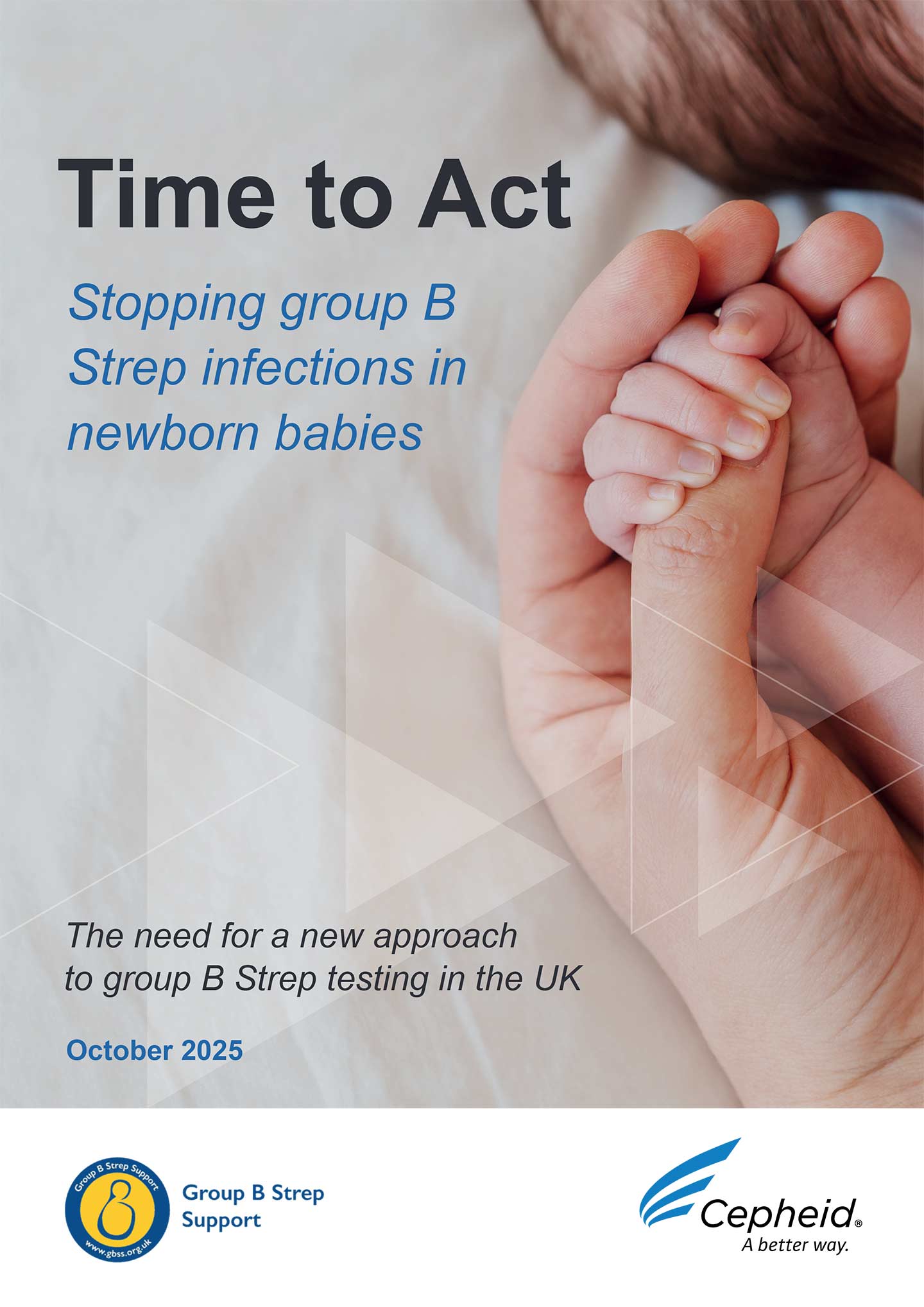3m Read
October 17, 2025
COMMUNITY AND GLOBAL HEALTH
Whitepaper
Time to Act: Stopping Group B Strep Infections in Newborn Babies
The content presented on this page is intended for informational and educational purposes. While it is available globally, it may reflect clinical practices or healthcare system considerations specific to a particular region.
Time to Act: Stopping Group B Strep Infections in Newborn Babies
Group B Streptococcus (GBS) is the leading cause of severe infections in newborns, including meningitis and sepsis. These infections can result in death or lifelong disability for affected babies and have a profound impact on families.1,2 Despite the availability of diagnostic technologies globally, the U.K. does not routinely test pregnant women for GBS carriage before birth, unlike countries such as the U.S., Germany, France, and Australia. This lack of routine testing, combined with inconsistent care and poor awareness, leads to preventable harm.3 Universal screening and intrapartum antibiotic prophylaxis (IAP) have been shown to decrease infection rates and improve outcomes for babies and families.4
Current U.K. Approach and Its Limitations
The U.K. currently employs a risk-based strategy for GBS prevention. Only those with specific risk factors—such as having had a previous baby with GBS, GBS detected in urine, or preterm labour—are offered antibiotics during labour (IAP). Routine testing for GBS is not offered to all, and GBS is not a notifiable disease, meaning cases may be underreported and the true burden is not fully understood.
Each month, 43 babies in the U.K. develop early-onset GBS infection; three survive with long-term disabilities, and two die.5 The infection rate in infants under one year is significantly higher than in the general population.6 Families affected by GBS face psychological trauma, financial hardship, and long-term care costs.7 The NHS also bears substantial costs from clinical negligence claims and ongoing care.8
Challenges and Opportunities for Change
The U.K. National Screening Committee currently does not recommend universal screening, citing concerns about accuracy, unnecessary antibiotic use, and unclear benefit-to-harm ratio.1 However, new evidence is being collected through the GBS3 trial, which is comparing universal testing (enriched culture media and PCR) against the risk-based approach. Results are expected in the Spring of 2026 and may inform future policy decisions.9
There is currently no licensed vaccine for GBS. A maternal GBS vaccine could prevent hundreds of thousands of cases annually and reduce the need for antibiotics during labour. However, questions remain about the duration of protection and effectiveness across different groups.10
Recommendations for Policy and Practice
Cepheid and Group B Strep Support (GBSS) have partnered on a prospective paper to address the need for a new approach to Group B testing in the UK. The following are call to action addressed in the paper:
- Make GBS a Notifiable Disease: Mandatory reporting would improve data collection and understanding of the true burden of GBS in the UK.
- Consistent Implementation of Guidelines: Ensure all NHS trusts follow national guidance for prevention, testing, and care, avoiding a postcode lottery of care.
- Expedite National Screening Assessment: The UK National Screening Committee should quickly review the results of the GBS3 trial and consider universal test-based screening.
Access the full perspective paper here

References:
- Royal College of Obstetricians and Gynaecologists, Prevention of Early-onset Group B Streptococcal Disease (Green-top Guideline No. 36) | RCOG, September 2017. Accessed October 2025
- World Health Organisation, Urgent need for vaccine to prevent deadly Group B streptococcus November 2021. Accessed October 2025
- Group B Strep Support, Screening will save newborn lives: A case for the introduction of routine screening for group B Streptococcus in late pregnancy, 2017 Accessed October 2025
- Fairlie T, Zell ER, Schrag S. Effectiveness of intrapartum antibiotic prophylaxis for prevention of early-onset group B streptococcal disease. Obstet Gynecol. 2013 Mar;121(3):570-577. Doi:10.1097/AOG.0b013e318280d4f6. Accessed October 2025
- Royal College of Obstetricians and Gynaecologists, Group B Streptococcus (GBS) in pregnancy and newborn babies | RCOG, December 2017. Accessed October 2025
- UKHSA, Laboratory surveillance of pyogenic and non-pyogenic streptococcal bacteraemia in England: 2023. Accessed October 2025
- Horváth-Puhó, Erzsébet et al. Mortality, neurodevelopmental impairments, and economic outcomes after invasive group B streptococcal disease in early infancy in Denmark and the Netherlands: a national matched cohort study. The Lancet Child & Adolescent Health, Volume 5, Issue 6, 398-407. Accessed October 2025
- Group B Strep Support, The cost of group B Strep infection. Accessed October 2025
- GBS3, Routine Testing for Group B Strep, 2024. Accessed October 2025
- UK Government, VDEC is supporting a GBS vaccine to prevent newborn deaths - Case study - GOV.UK May 2024. Accessed October 2025
Read Next
More







